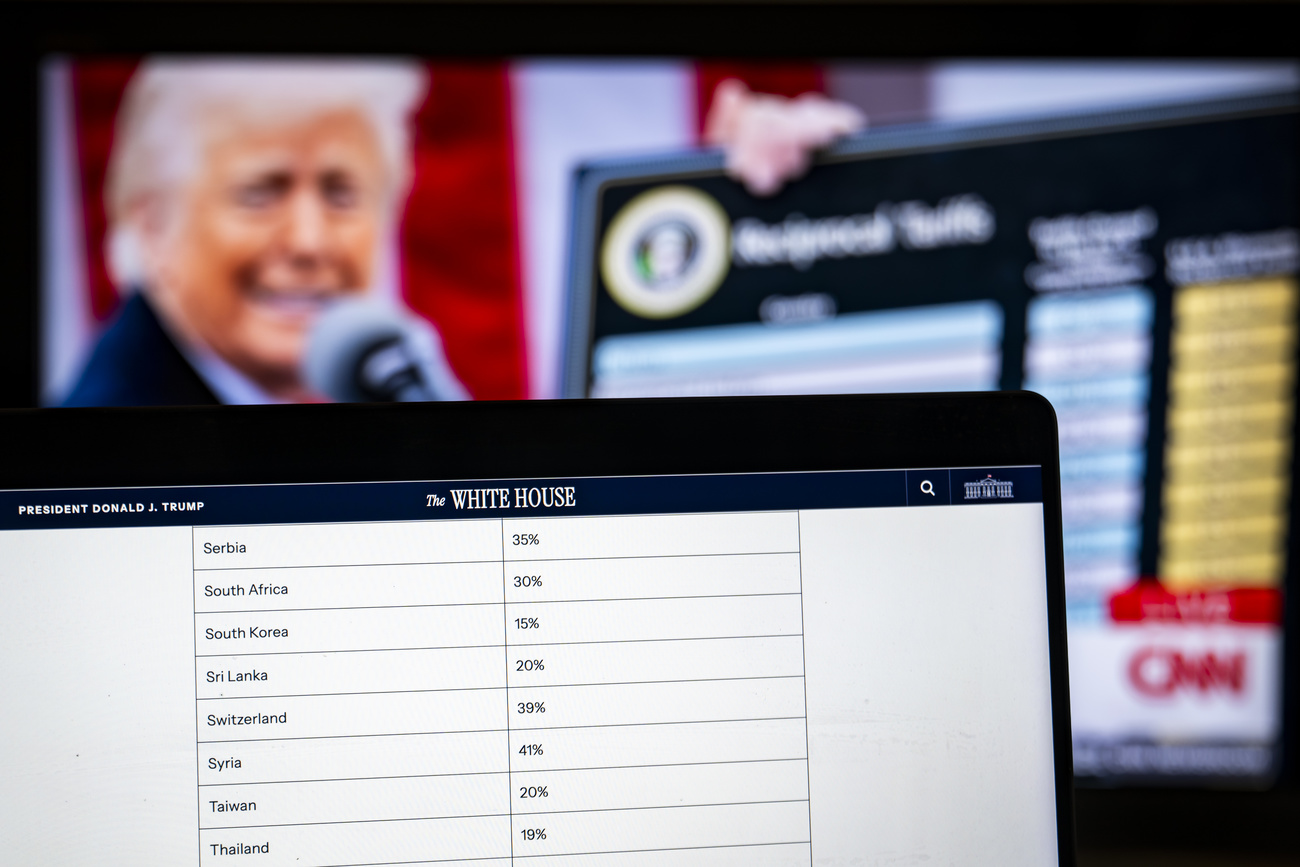
A view of the White House website with customs duties in front of a television screen.
Keystone / Jean-Christophe Bott
President Karin Keller-Sutter is under fire for failed trade talks with Trump administration
A blame game has erupted in Switzerland after the US announced an unexpected 39% tariff rate on the Alpine country on its national day.
Swiss President Karin Keller-Sutter is accused of grossly miscalculating the trade deal she thought she was able to secure with the Trump administration. Other critics are rounding on the country’s vast pharmaceutical industry for having sparked the ire of the US president.
External Content

“It’s knives out,” a former Swiss diplomat said.
Late on Thursday, Keller-Sutter held a “disastrous” phone call with Donald Trump, according to multiple people familiar with the situation.
The 30-minute conversation capped more than three months and hundreds of hours of negotiations in which Swiss officials believed they were on track for securing a deal similar to the UK — a 10% tariff rate. Instead, Trump announced a 39%, one of the highest in the world — on Friday, when Switzerland was celebrating its national day.
The Swiss media roundly criticised Keller-Sutter, with SonntagsZeitung calling the failed talks her “biggest fiasco” and tabloid Blick going as far as saying this was Switzerland’s greatest defeat since 1515, when it lost a battle against the French.
Swiss officials were blindsided because they were led to believe their talks with US trade representative Jamieson Greer and Treasury secretary Scott Bessent were going well and a provisional deal had been reached, the people said. In April, Switzerland said it was confident about securing an early trade deal as it was willing to pledge nearly $150 billion in US-bound investment.
Keller-Sutter, finance minister and president this year as part of the country’s rotating system, in July said she had found “access to Trump” — unlike many other countries struggling to secure meetings with US officials.
The Swiss side was ready to agree to a tariff rate of 10%, Trump’s baseline rate, according to two people familiar with the situation. This negotiating position was approved by Bern on July 4.
But on Thursday’s phone call Trump only cared about one thing: Switzerland’s $39 billion trade imbalance with the US and what more the “very wealthy” Alpine country could offer.
“The call did not go well in the sense that from the very first minute Trump made it clear 10% was not enough and all he could focus on was Switzerland stealing money from the US,” said one of the people. “There was nothing Keller-Sutter could say.”
Greer on Friday described as an “overstatement” Bern’s belief that it had secured a text that was just awaiting Trump’s signature. “Nothing is agreed until everything is agreed,” he told Bloomberg.
The result was a shocking 39% tariff rate. Not only was it one of the highest globally, it was markedly higher than the 31% levy on Switzerland Trump had announced in April on what he called “liberation day”. By comparison, most other countries received a lower rate on August 1 compared with April.
The Alpine country itself has already abolished all industrial tariffs and the US is the country’s top export market for goods including watches, chocolate and machinery. It is also a huge investor in the US, with Nestlé, Roche and Novartis employing thousands of Americans.
Gold exports — often transiting through Switzerland for refining or trade — are largely responsible for the country’s trade imbalance with the US. Yet both gold and pharmaceutical products are exempt from Trump’s “reciprocal tariffs”, adding to the bewilderment in Bern over what more it could offer.
“The problem is the Swiss believe we have to make reasonable and honest offers. We are not good at international power politics,” said one person close to the discussions. “There was uneasiness at making large pledges like other countries have that are not realistic. It was a painful lesson.”
But while Keller-Sutter received most of the blame, some corporate voices lashed out at the influential pharmaceutical sector for torpedoing the talks.
Swiss watchmaker Breitling’s chief executive Georges Kern said his country was being “held hostage” by the pharmaceutical industry that had irritated Trump.
Switzerland’s pharmaceuticals sector sends about 60% of its exports to the US. Novartis and Roche’s US subsidiary Genentech were among the pharmaceutical companies that received letters from the Trump administration this week demanding that they lower drug prices. The Swiss companies have pledged billions in US investment this year.
Greer on Friday also homed in on pharma: “They ship enormous amounts of pharmaceuticals to our country, we want to be making pharmaceuticals in our country.”
The Swiss stock market, which was closed on Friday, is bracing itself for losses when trading resumes on Monday. Novartis, Roche and consumer goods group Nestlé, as well as luxury watch companies Richemont and Swatch are all listed on the Swiss exchange.
The Swiss-American Chamber of Commerce, meanwhile, insists that Switzerland’s investment pledges could still result in a better deal.
“We have nine million people in Switzerland, yet our investment pledge per capita is much more than what Japan or the EU have pledged. If we talk about a $40 billion trade deficit, one has to put that [in] perspective,” said Rahul Sahgal, chief executive of the Swiss-American Chamber of Commerce.
Sahgal, whose group was part of a number of rounds of negotiations between the two countries, said Switzerland needed to “try to figure out what else we can offer. We are seeing if we can have a meeting.”
Copyright The Financial Times Limited 2025



